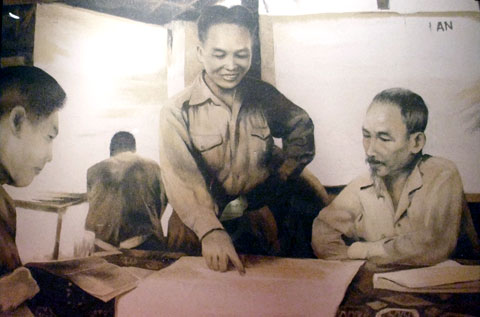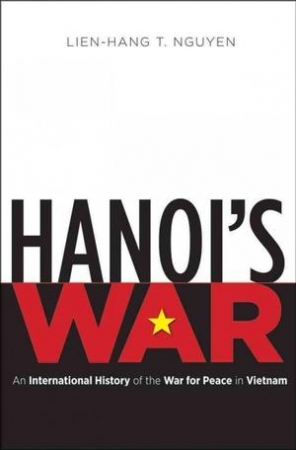Book Review: “Hanoi’s War” — A Must-Read About the War in Vietnam
“Hanoi’s War” deserves far more attention than it has thus far received. It enriches our understanding of the War in Vietnam and by implication, subsequent American commitments, including the war in Afghanistan.
Hanoi’s War: An International History of the War for Peace in Vietnam by Lien-Hang T. Nguyen. The University of North Carolina Press, 464 pages, $34.95.
By Harvey Blume
Whatever you think you know about the war in Vietnam will be challenged, revised and deepened by this remarkable book. If you are of my generation, for which the war in Vietnam, whether you were for or against it, was a coming of age crucible, Hanoi’s War is a must-read.
Lien-Hang T. Nguyen is a Vietnamese American, born, she writes, “in Saigon in 1974 [with] kin who served on both sides of the war.” Her family fled Vietnam in the tumult of Saigon’s fall. Hang — as she shortens her name — grew up in a working class neighborhood of Pennsylvania where the traumas and tragedies caused by the war were dealt with by silence. She writes: “My family and I were shameful reminders of a war that should never have been fought”, adding: “I did not live [the war], but who I am is a direct result of it.” Her book came out of a need to understand decisions “that led to the deaths of approximately 58,000 Americans and an estimated 2-6 million Vietnamese.”
Much is known about decisions made in Washington, by Presidents Kennedy, Johnson, and Nixon. The logic of the no less momentous decisions made in Hanoi has remained, for the most part, obscure — until this book. Hang’s focus is on how the leadership in Hanoi steered a divided third world country into full-scale war with the world’s major military power, while navigating the shoals of the increasingly rancorous — and for Hanoi, treacherous — Sino-Soviet split.
The Soviet Union and China wanted to be seen as supporting Hanoi in the signal anti-colonial cum revolutionary struggle of the day. What they insisted upon in return was that Hanoi obey their dictates as to how the war should be fought, so that it accorded with their national interests and with communist ideology as they promulgated it. Their strictures could extend from weighty issues such as whether peace talks should be held — the Soviet Union largely in favor, China largely opposed — to the micromanaging of Hanoi’s military efforts. Mao, after all, was the fabled genius of guerilla war: to disobey his instructions could be taken as an insult to the Great Helmsman. China provided less material support to Hanoi than the Soviet Union but the threat of its intervention imposed some limits on the application of American force.
All this was further complicated by Nixon’s trip to China, and his subsequent visit to the Soviet Union. Both Moscow and Beijing sought the kind of relationship with Washington that would free them to confront other in earnest, in combat if necessary. Hang points out that the rivalry between the two Communist powers had pushed well beyond Marxist polemics by 1969 when “no fewer than 400 clashes occurred between the two nations’ border troops.”
It took extraordinary acumen and determination for Hanoi’s leaders to maintain “equilibrium in the Sino-Soviet split in order to conduct a total war for reunification [in] epic battle with the United States.” It also took the imposition of a police state, designed to silence dissenting voices. There were those in the Hanoi’s VWP (Vietnam Worker’s Party) who wanted to focus on building socialism in the North, leaving the question of reunifying Vietnam for later. Others favored protracted guerilla struggle against the Saigon regime and the United States. There were also those who promoted the idea of decisive military engagements, which would, they believed, trigger widespread uprisings in the South, topple the Saigon regime, and drive the United States out. It was this group that prevailed. They were the architects of the Tet Offensive in 1968, and similar offensives to follow, all of them failures in military terms, in which the North Vietnamese and the Viet Cong suffered, Hang writes, “staggering” losses.

President Ho Chi Minh and General Vo Nguyen Giap discussing Dong Khe battle during the Border Campaign 1950.
It is one of the revelations of this book that Ho Chi Minh and General Vo Nguyen Giap were strongly opposed to the strategy of General Offensive and General Uprising of which Tet was a part. Both were marginalized when it was enacted. By the time of the war with the United States — sometimes known as the Second Indochina War — Ho was an aging figurehead. He was revered for leading Vietnam to victory against the French but criticized for acceding to the Geneva Accords of 1954 that left the country divided. Giap, similarly, was respected for the strategy of guerilla war culminating in the French defeat at Dien Bien Phu but came close to joining his followers in prison for advocating the same strategy be employed against the United States.
Hanoi’s real leader — Le Duan — was largely unknown in the West and might have remained so but for this book. Le Duan combines steely resolve with a certain romanticism. He was married in Hanoi but maintained a lifelong commitment to a woman who had been his comrade in arms in the Mekong Delta during the war against the French. He is, in a sense, emblematic of the Second Indochinese war, a ruthless patriot who having seen the French replaced by the Americans in the South is willing to go to any lengths to reunify his country. Content to make use of Ho’s charisma and Giap’s reputation, it was Le Duan with the assistance of his ally Le Duc Tho, who forged the police state by means of which the Vietnamese were prodded into full-scale war and compelled to accept the terrible sacrifices arising from the strategy of General Offensive and General Uprising.
Though focused on Hanoi, Hang gives due attention to Washington. We see Nixon as, in a sense, the mirror image of Le Duan, centralizing power and enforcing secrecy as he evades Congress and his own cabinet to launch massive aerial bombardments of Laos and Cambodia. Nixon trades on his reputation as an extremist, withdrawing ground troops while escalating the air war, convinced all the while, Hang writes, that he could find Hanoi’s breaking point “by exploiting his reputation as a hard line Cold Warrior who was willing to take irrational military means to achieve his objectives. Confiding to. . . Haldeman, Nixon stated, ‘They’ll believe any threat of force Nixon makes because it’s Nixon.'”
The story Hang tells is, she acknowledges, incomplete. Vietnamese is her first language, her fluency in English achieved in the ESL classes she attended throughout elementary school. Her language skills let her make the most of the access she won, as a scholar, to the archives of the Hanoi’s Ministry of Foreign Affairs. She notes that she is the only scholar, Vietnamese or otherwise, to have “received this honor.” She is also quick to say that the archives of Vietnamese Communist party and of the army remain sealed, and are essential to a full account of the war. On the basis of this book, one has the right to hope and expect that when those archives are opened, she is given access.
I was alerted to Hanoi’s War by an op-ed Hang wrote for the New York Times this past summer. The book deserves more attention than it has thus far received. It enriches our understanding of the War in Vietnam and by implication, subsequent American commitments, including the war in Afghanistan.



I could go for months without thinking about Vietnam. I just don’t know if I want to re-visit that old mess. But this sounds like a pretty good book.
i think, in a sense, the vietnam war & my response to it is always on my mind.